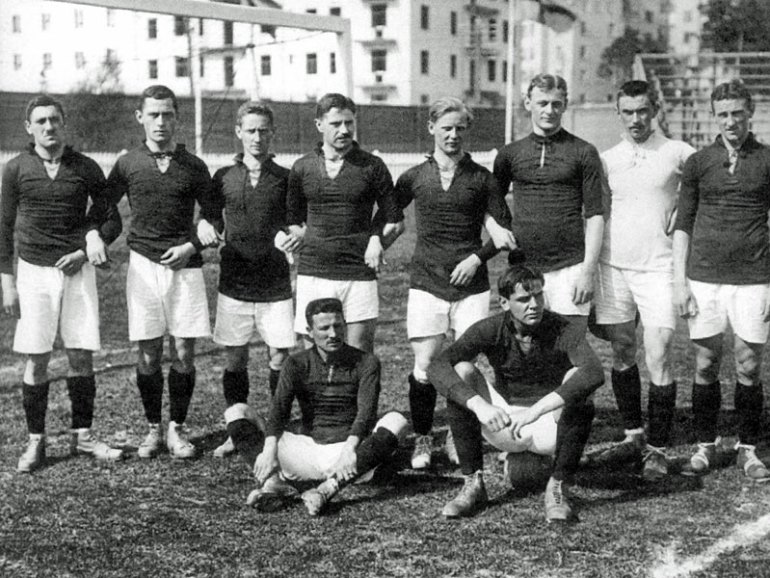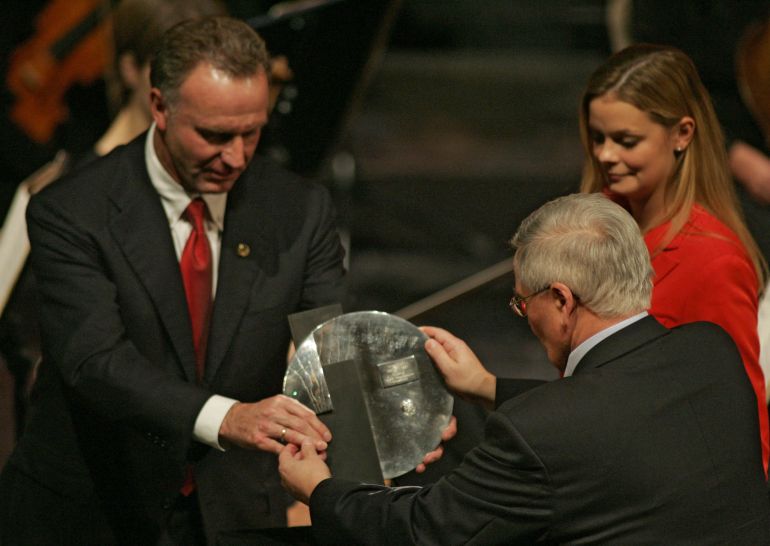Julius Hirsch: The German ‘national hero’ killed by the Nazis
Only the second Jew to play for Germany, Hirsch broke records and fought in WWI for a country that would later kill him.

Julius Hirsch never visited the United Kingdom, but the German footballer’s memory lives on in a corner of southwest London.
On the outside wall of Chelsea’s famous stadium Stamford Bridge, surrounded by towering images of some of the club’s legendary captains lifting silverware, is a colourful 12-foot mural of Hirsch and two others – the Hungarian winger Arpad Weisz and the Englishman Ron Jones, who was known as the “Goalkeeper of Auschwitz”.
Keep reading
list of 4 itemsEuro 2024: Ronaldo to play in sixth European Championship
Australia’s Sam Kerr ruled out of Paris Olympics with knee injury
Man City clinch historic fourth Premier League title despite Arsenal win
Jones survived the notorious German concentration camp, but both Hirsch and Weisz are believed to have been killed there during the Holocaust. The unveiling of the mural in January 2020 as a part of Chelsea’s “Say no to antisemitism” campaign marked the 75th anniversary of the liberation of Auschwitz.
“By sharing the images of these three individual football players on our stadium, we hope to inspire future generations to always fight against antisemitism, discrimination and racism,” Chelsea chairman Bruce Buck said at the time.
Yet while Hirsch is today remembered in Germany and beyond as a pathbreaking and brave athlete, his story is also a reminder of a dark chapter in the history of one of the world’s most successful football nations.
Hirsch led a pioneering, turbulent and ultimately tragic life as the second-ever Jewish person to play international football for Germany. He was a decorated soldier who fought in World War I before being murdered by his own country.
History-making talent
Born in the village of Achern in southwest Germany in April 1892, Hirsch was the youngest of seven children born to Emma and Berthold, a Jewish merchant who had fought in the Franco-Prussian war that united modern Germany. The family moved to Karlsruhe when Hirsch was seven years old. Three years later, after showing a talent for football, he joined the local team Karlsruher FV, which had been founded by a Jewish businessman.
At the age of 17 in 1909, he made his debut for the first team and was soon recognised for his impressive left foot, powerful shot and prolific goal-scoring.
He played for an English manager, the former Blackburn Rovers and England player William Townley and would form a part of a famous attacking triumvirate with Gottfried Fuchs and Fritz Forderer, who inspired Karlsruher FV to the German championship in 1910.
The following year Hirsch became the second-ever Jew to play for Germany after Fuchs, when he faced Hungary in December 1911, aged only 18 years old. He then represented his country at the 1912 Olympic Games in Stockholm.

Hirsch became the first German to score four international goals in a game in a 5-5 draw with the Netherlands in Zwolle in March 1912. His club teammate Fuchs would spectacularly overtake his record by scoring 10 goals against Russia in July 1912.
Hirsch played as an amateur and worked for his family textile business, because of which he had to move to the small city of Furth in Bavaria where he signed up to play for SpVgg Greuther Furth. In his very first season in 1914, he helped them win the German championship to become the first player ever to win it with two different teams.
When World War I broke out, Hirsch enlisted in the army with the Royal Bavarian Landwehr Infantry Regiment and was awarded the Iron Cross in 1919 for his courage and gallantry. His brother Leopold died during the Battle of Kemmel Ridge in Belgium in April 1918. Two other brothers, Max and Rudolf, also fought in the war, and were awarded the Iron Cross.
After the war, Hirsch returned to play for Karlsruher FV for another six years before he retired in 1925. He continued to help at the club as a committee member and youth coach. In 1920, he married Ellen Karolina Hauser, a Christian. They had two children, a son Heinold and a daughter Esther.
Not Hitler’s kind of hero
But in 1933, Adolf Hitler was elected German chancellor. Within months, football clubs across the country responded by purging their Jewish members.
On April 10 that year, Hirsch tendered his resignation to Karlsruher FV, a club he had been a member of for more than three decades, to be spared the indignity of being forced out.
“I read in the Stuttgart Sports Report that the biggest clubs including the KFV made the decision to remove Jews from their organisations,” he wrote to them. “I have been a member since 1902, and at that time I loyally and honestly dedicated my weak abilities to the club…. I would like to say that in this brutal German nation, so hated around the world, there are decent patriotic people including German Jews who have demonstrated their good faith through their actions and their bloodshed.”
Under Nazi rule, his family business went bankrupt, and he became increasingly fearful and isolated, suffering a nervous breakdown.
As the Nazis began to burn down synagogues and openly attack Jewish shops and people, Hirsch’s marriage to a Christian — and their children of mixed heritage — offered him little immunity. In 1939, he was placed into forced labour by the municipal works service at a dump in Karlsruhe.
In December 1942, in an effort to protect his family, Hirsch divorced his wife to allow her and their children, who had been banished from school, to use her maiden name and hide their background. Yet this also removed whatever little chance he had of avoiding the deportations that had seen Jews disappear.
On March 1, 1943, he reported to Karlsruhe train station to be transported to the Auschwitz concentration camp for what the Nazis called “employment of labour in the East”.
His daughter Esther accompanied him to the station. “It is one of my worst memories,” she wrote afterwards. “It was a lovely day; to this day I don’t understand how the sun could have been shining. We didn’t believe that we would never see him again.
“That night, we, mother, my brother and I, all woke up simultaneously. At the same moment, we all thought: something has happened. My father never thought that the Germans would be able to do something to him. He couldn’t imagine that they would do something to a soldier at the front and a footballer in the national team. He was connected to Germany, he was pro-Germany, as was his brother.”
“It was so humiliating for him to perform forced labour in Karlsruhe. He was a good man, always so understanding. I loved him very much, and I’m still grateful to him for his affection.”
Two days later, Hirsch sent a letter to Esther for her 15th birthday, believed to be from a stop at Dortmund en route to Auschwitz. He wrote: “My darling, I am very well, and I arrived safely. I will [eventually] reach Upper Silesia, [and will] still [be] in Germany. Greetings and kisses, Juler [Julius].”
This was the last the family ever heard from Hirsch, who is believed to have died in Auschwitz, although there was no record of him having reached the camp. It is thought he might have been gassed as soon as his train arrived without being officially registered. In January 1950, a German court declared him dead and set his date of death as May 8, 1945, when he would have been 53 years old.

Hirsch’s legacy lives on
In February 1945, his two children — defined by the Nazis as “Mischling”, a pejorative term used by them to describe people who were of a mixed race or not fully “Aryan” — were deported to the Theresienstadt concentration camp in what is today the Czech Republic. They survived until the camp was liberated by the Soviet Red Army in May of that year. His wife Ellen also survived and after the war changed her name back to Hirsch.
Hirsch’s former teammate Fuchs avoided the fate of his one-time goal-scoring ally by escaping to Switzerland and France before settling in Canada, where he died at the age of 82 in 1972.
Forderer, their other teammate who was not Jewish, followed a very different path. He joined the Nazi party in 1942 and would go on to coach various football teams, including one comprised of members of the Third SS Death-Head unit that ran the Buchenwald concentration camp and who were responsible for the deaths of 56,000 people.
By then, Hirsh had already been airbrushed out of history. In 1939, when the German football magazine Kicker produced an edition listing all the players who had ever played for the national team, Hirsh and Fuchs — with 13 games and 17 goals between them — were not mentioned.
It was not until the 1990s that their achievements began to earn greater recognition. In 1998, the sport hall at Ludwig-Marum school in Pfinztal-Berghausen was named after Hirsch, and in 2014, Karlsruhe city council named a street after Hirsch and a square after Fuchs in the shadow of the stadium where they had played together more than a century earlier.
In 2005, the German Football Federation (DFB) launched the Julius Hirsch Prize, which is awarded each year to an individual, club or campaign that shows a commitment to democracy and human dignity, and opposition to anti-Semitism and racism. Hirsch’s grandson Andreas Hirsch sits on the jury for the award.
“Julius Hirsch had been a national hero, but from one day to the next, was treated like an insect,” Theo Zwanziger, the then-president of the DFB, said in 2005. “We want to come to terms with our past and not just brush over all of this.”
Over at Stamford Bridge, it is clear that Hirsch is no longer remembered just as a “national hero”. A genocidal regime killed him 77 years ago. It could not kill his legacy.
